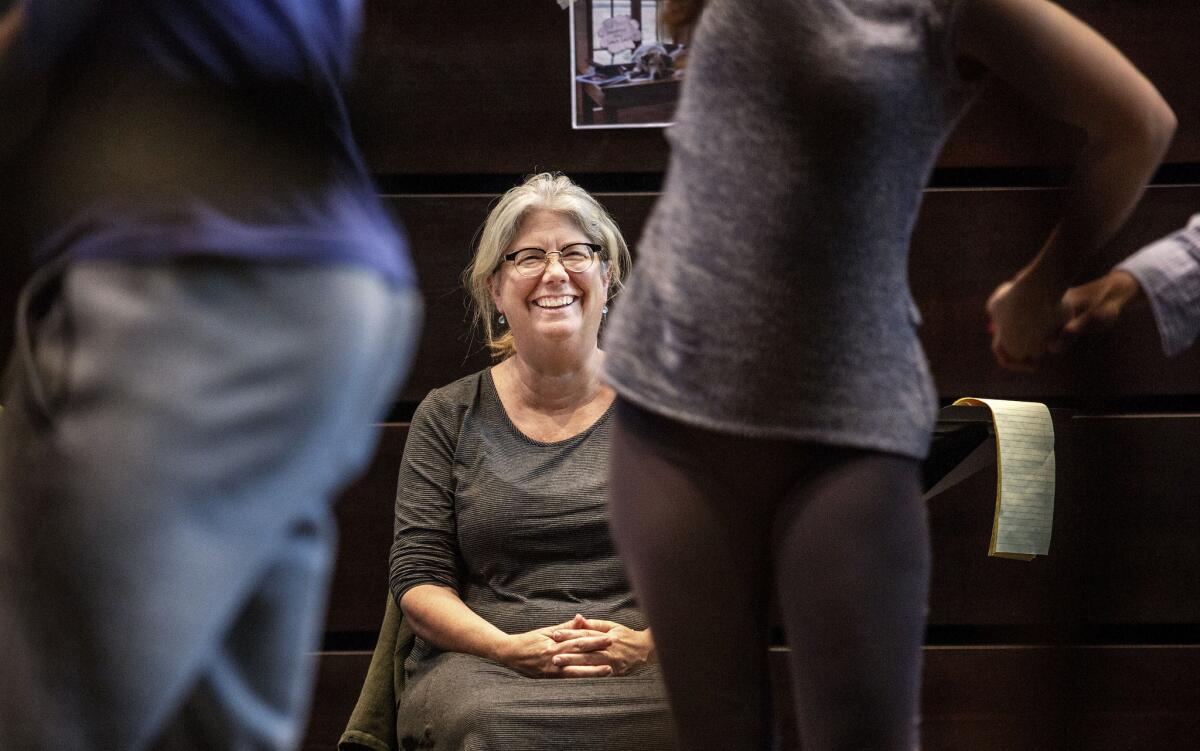Mary Zimmerman: Theater at ‘the moment of discovery’
- Share via

Mary Zimmerman watches her “Guys and Dolls” actors rehearse a scene. (Ricardo DeAratanha / Los Angeles Times)
When theater director-adapter Mary Zimmerman was bestowed a MacArthur Foundation fellowship in 1998, she was commended for developing “a distinctive style that blends strong visual images, sensual movement, music, and poetry to create a new theatrical vocabulary.” That style was born of her love of literature and nurtured at Northwestern University, where her interests in directing and adapting grew from class exercises. She went on to win a 2002 Tony Award for her direction of “Metamorphoses,” her adaptation of Ovid, and her prolific output is seen regularly at home in Chicago and at regional theaters across the country. Two of her projects are lined up for California: Her staging of the classic American musical “Guys and Dolls,” playing in December at the Wallis Annenberg Center for the Performing Arts in Beverly Hills, and her adaptation of Robert Louis Stevenson's “Treasure Island,” which she directed, headed in April to Berkeley Repertory Theatre. Here are five insights into her work:
Quite the page-turner
As a youngster, Mary Zimmerman was an eager reader of myths and folk tales, many of which she has now staged.
“I read every word over and over,” she says of her younger self. She understood that these were fairy tales, but also “they were adult, and that was really attractive. There was something mysterious and profound and quite dark … that just pulled me toward them.”
Why is she drawn to put them onstage?
“I want to make the world that world, with all of its beauty and its poetry and its morality and adventure and stunning surprise and mystery and mystery solved. I just want to live in it. And I want to hear that language; I want other people to hear it.”
How it's done
When adapting a classic story, Zimmerman begins without a script, instead shaping the text during rehearsals, inspired by her actors.
“I write the text, bit by bit, the night before rehearsal,” she explains. “I’m very inspired by who’s in the cast and the situation [of the world] at the time of our performance, the set we’ve come up with. There’s a very vivid, lively, organic quality to the process. … I love being present at the moment of discovery; I love figuring things out; I love the combustion of the idea in the room when it all falls together. ... We're growing up together in the text. It's being made by all of us.”
This is the world
The images in Zimmerman’s productions – which often seem to materialize out of thin air, shaped from everyday objects – may leave theatergoers thinking she’s pretty clever, but she hopes people leave thinking about the story, not about her.
“I’m not about expressing myself,” she says. “I’m about trying to get the text onstage. And when it wasn’t written for the stage, I have to use every imaginative trick I can think of, every metaphor, every element of the theater – the lights, the costumes, songs, dance, anything I can do – to convey someone flying on a carpet. Because I’m just in a box, a black box, and I have to figure out how to bring the world into it.”
Say it with music
Music is integral to Zimmerman’s productions, even when she’s not staging an opera or musical.
“I don’t think I’ve done anything in my life that didn’t have a song or two,” she says. “That’s so much a part of my sense of what a show is, what a play is. …Music is so beautiful and rhythmic, and relates to poetry.”
In “Treasure Island” Zimmerman incorporates a couple of traditional sea chanteys, as well as songs in the same musical spirit that frequent collaborator Andre Pluess set to Zimmerman’s lyrics.
In the room together
How can theater compete in a wired world, where entertainment of any sort can materialize in the palm of your hand?
“Our ace up the sleeve is presence, unmediated presence, the fact that it’s actually happening in front of you,” she says. “Theater is where all parties have to actually show up; you must be present to collect prize; you must be there. And I know it’s effortful – getting in your car and getting through the traffic and getting to your seat – and a kind of high risk that maybe the play is going to be slow or dull or maybe it’s going to lecture you. … But there is also something so communal about it. … We are there, handing you the fruits of our labor, and we can’t complete what we’re doing without you, and you affect what we’re doing. If you laugh for a long time, we hold for you, we wait; there’s an exchange. A film is indifferent to that exchange, but we are not; we are very attuned to our audience.”
Further reading
Los Angeles Times reviews of Mary Zimmerman productions.
”Metamorphoses” “The Arabian Nights”See more photos of Zimmerman's productions and read the Los Angeles Times' interview with the director.
The biggest entertainment stories
Get our big stories about Hollywood, film, television, music, arts, culture and more right in your inbox as soon as they publish.
You may occasionally receive promotional content from the Los Angeles Times.








